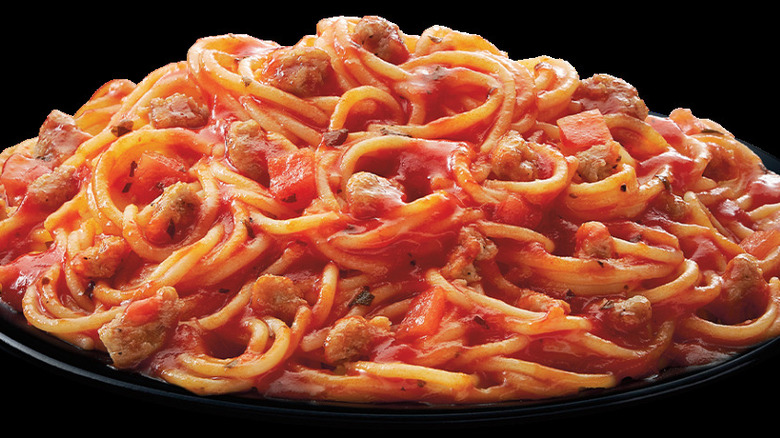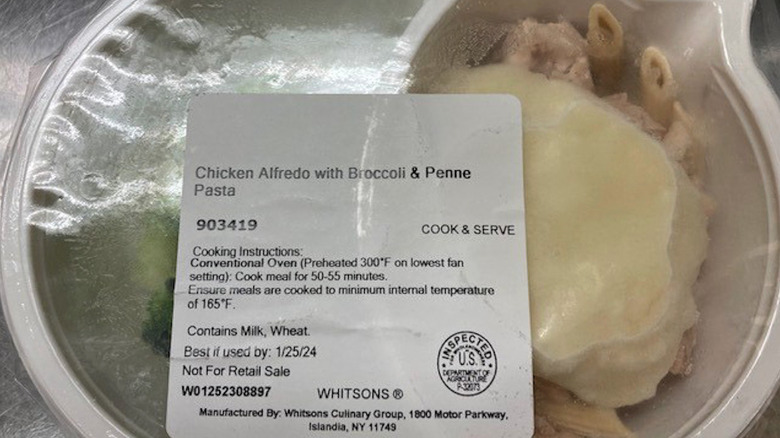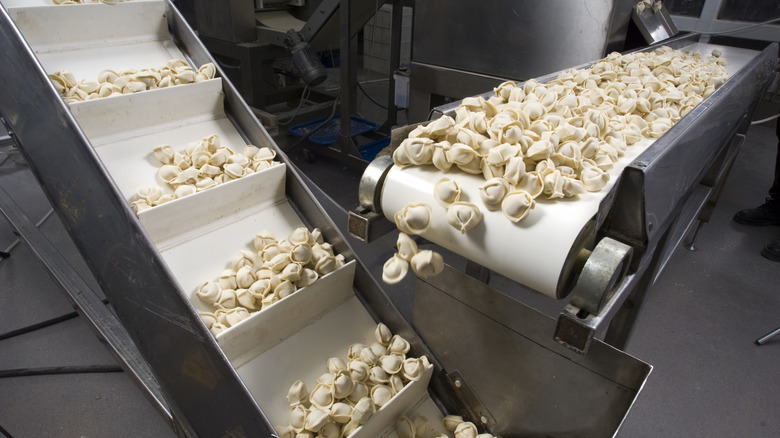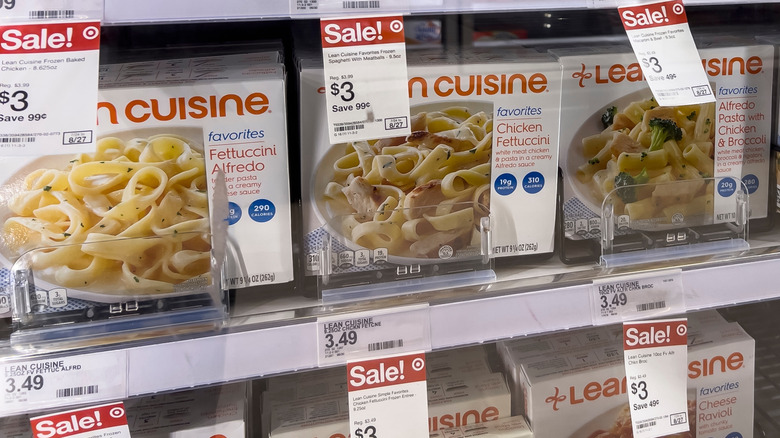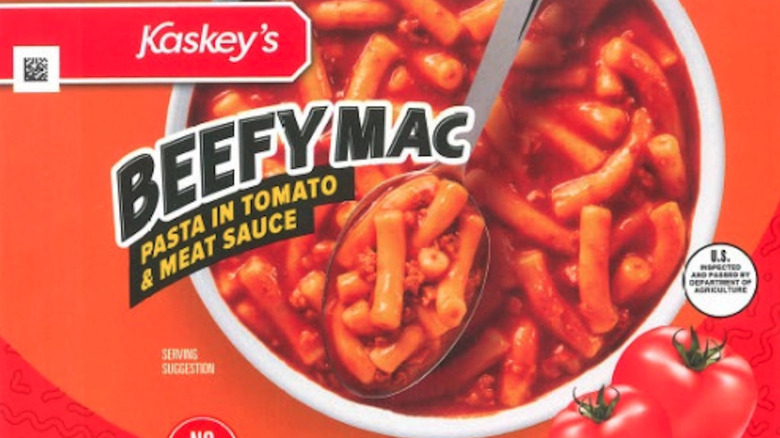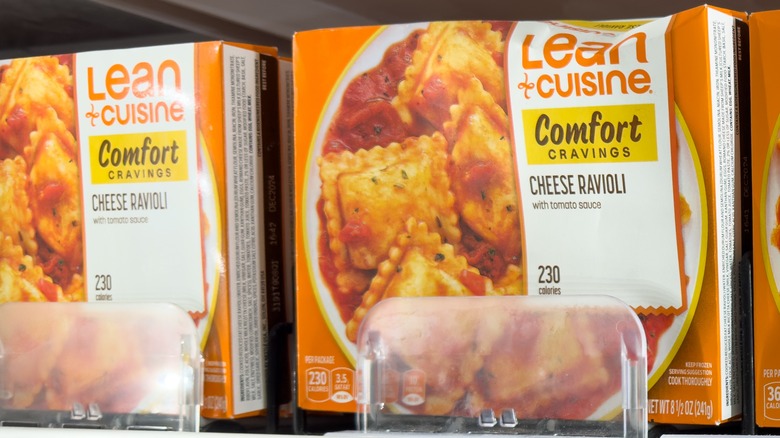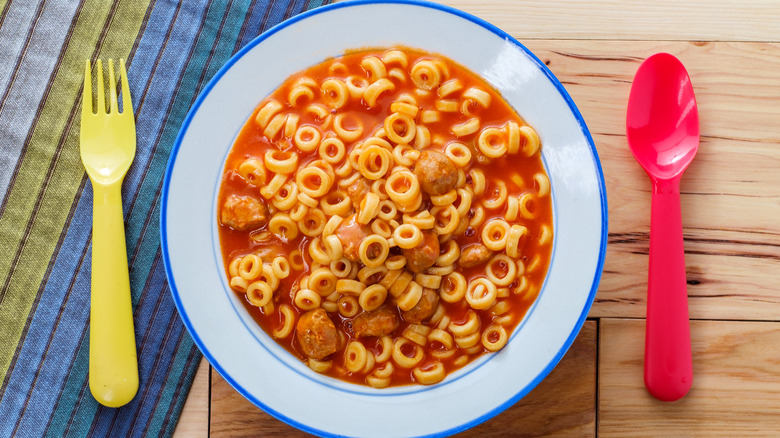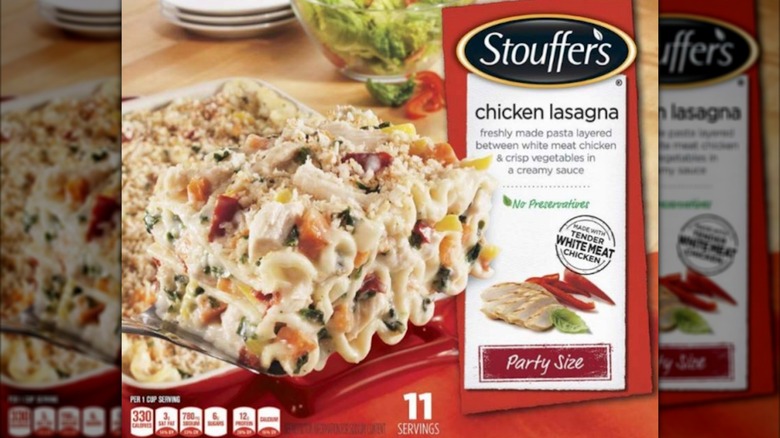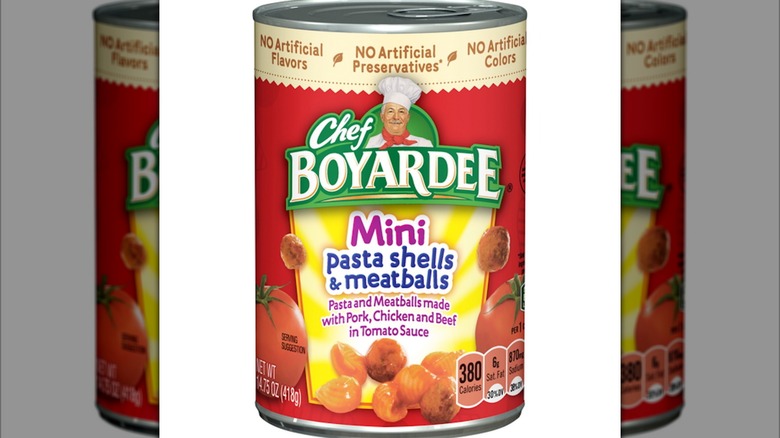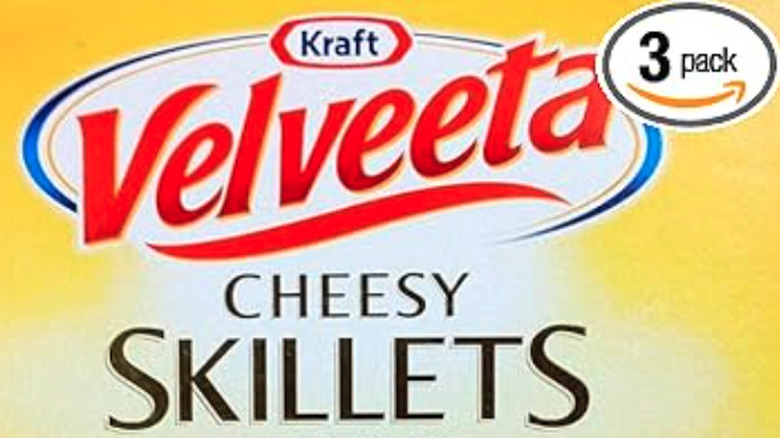15 Massive Pasta Recalls That Swept Across The US
Between canned goods, frozen entrees, and pot-ready styles made from all kinds of flours, there is little standing in the way of making any night a pasta night with ease. For those less keen on shaping their pasta from scratch, one surefire possibility to put the kibosh on a spaghetti Wednesday comes with finding out that the go-to meal faced a safety recall. Whether reaching into the pantry to whip up some macaroni and cheese or preheating the oven to bring a store-bought lasagna to life, many steps go into bringing food from production to plate — leaving a lot of room for things to go wrong.
Foreign contaminants, allergy risks, and the unknown brought from failing to have an inspection were among the many reasons recalls have taken place across the United States impacting consumers, retailers, restaurants, and warehouses alike. Below are some examples laying out how even the simplest mistake could amount to the recall of millions of pounds of otherwise safe pasta.
Soy had spaghetti heading back to Ohio
The prevalence of allergies in modern society justifiably warrants a better safe than sorry approach to handling the biggest culprits in causing reactions. So, when it was discovered that ingredients in Michelina's Spaghetti with Meat Sauce frozen trays may have inadvertently come in contact with ingredients containing soy near the end of April 2021, the U.S. Department of Agriculture's (USDA) Food Safety and Inspection Service (FSIS) responded with a recall.
Impacting nearly 4,000 pounds of product, the May 4, 2021 recall was issued after Bellisio Foods, Inc.'s Jackson, Ohio facility had raised it's concern about the possible contamination as the spaghetti products did not provide a soy warning on their labels. While those without allergies remained safe to enjoy their frozen entrees, those who did face risks from contact with soy were advised to discard the meals or return them to the store for compensation like a refund or exchange.
Ravioli made it to market without proper review
Regularly associated with Italian cuisine, the versatility of pasta exceeds borders. This is especially true when utilizing the myriad stuffed options that allowed ravioli to become a vessel for international delights. Of course, while gourmands enjoy any number of fillings, inspectors can not abide the potential for a total surprise to make it on anyone's plate. As a result, more than 4,500 pounds of Mrs. Pasta products were recalled in October 2023 after they shipped out without a proper federal inspection.
While the short ribs ravioli, veal ossobuco ravioli, and tortellini bolognese produced at Mrs. Pasta's Fort Lauderdale, Florida facility had been created with a USDA mark of inspection, a referral from the Florida Department of Agriculture and Consumer Services led the agency to determine there had been no proper inspection at all. This was confirmed as the number on the USDA mark referenced a separate facility than where the product had originated.
Lasagna and linguini shared in a packaging mixup
Like a snowball turning into an avalanche, the simplest problems often escalate when they aren't addressed at the onset. For Michael Angelo's Foods, Inc.'s Austin Texas facility, such a situation meant one recall had expanded to two encompassing nearly 5,700 pounds of food. What had started with over 4,200 pounds of shrimp scampi with linguini went on to include more than 1,400 pounds of lasagna after labels got shuffled. The July 2016 recall had been expanded in August and was first discovered when customers had complained that their shrimp scampi actually contained chicken piccata.
The packaging snafu went on to include the Uncompromisingly Italian-Style Lasagna with Meat Sauce products which contained shrimp scampi. In addition to seeking to prevent further upsetting customers discovering they'd brought the wrong food home, Michael Angelos' recall also sought to stave off allergy risks posed by egg, shrimp, and soy that were not denoted on the incorrect packages. Given the option to discard or return the products, FSIS detailed that roughly a third of the designated meals had been recovered after the recall.
Product changes posed a problem for penne
In February 2023 an updated recipe for a chicken Alfredo sauce failed to identify the new allergy risk it posed from egg, impacting institutions that included some serving children. Discovered after a customer complaint, Whitson's Food Service Corp. in New York issued a recall of more than 8,700 pounds of product that included Chicken Alfredo with Broccoli & Penne Pasta as well as Chicken Strips over WW Penne Pasta with Alfredo Sauce & Broccoli.
The problem had been sourced back to a communication failure to the nutrition department which hadn't been notified of the recipe change. That resulted in the lack of warning to consumers about the risk. Like with other allergies, adverse reactions to egg can happen fairly quickly or within hours after consumption and include symptoms like rashes, vomiting, or digestive troubles. Schools in New York and Pennsylvania were among the institutions that had been sold the products via a commercial retailer.
Nearly 10,000 pounds of pasta products missed inspection
Where some recalls can be traced back to a momentary lapse, a March 2021 recall out of Evanston, Illinois was nearly a year and a half in the making. Impacting more than a 100 different kind of ravioli and tortellini produced by Avanza Pasta, LLC., almost 10,000 pounds of product were subject to recall for failing to undergo inspection before getting shipped across Illinois, Indiana, and Wisconsin.
Brands including Ambrosino's, Gene's, Nature's Best, and S&T Provisions were among those impacted after surveillance efforts by the FSIS determined that none of the goods bore the proper mark of inspection. In addition to retailers, the pasta products had made their way to distributors and restaurants and were identified by their specific best by dates. Considering the length of time over which food had been produced, it was hardly surprising that less than 800 pounds had been reported recovered and the FSIS indicated that it had not been made aware of any problems from people who may have consumed the uninspected pasta.
Errant chicken impacted almost 15 tons of fettuccini
As consumers were reeling from the impact COVID-19 was having on the supply chain — on top of their everyday lives — more than one ingredient mistake had stirred Nestlé to recall almost 30,000 pounds of Lean Cuisine Fettuccini Alfredo. For starters, the May 2020 issue found vegetarians and fowl-averse consumers surprised to discover that the frozen entrees contained chicken. Evidently, the meatless meals had been distributed nationwide in cases labeled as Chicken Fettuccini despite being inspected. It was only after complaints had been made that the problem from the Jonesboro, Arkansas facility had been discovered.
Making matters worse beyond those seeking a vegetarian Italian recipe, an allergy risk was posed by the pasta as well. Nestlé had described the recall as impacting a "limited amount" of product due to the inclusion of soy in the ingredients that had been left off labeling. Evidently, the error applied to one specific batch code with a best by date for the following year.
A bacteria risk discovered in Pennsylvania reached all the way to Texas
The USDA's no-nonsense approach to food safety goes without question considering the severe implications should contaminants or allergens make it to market. This was evident in July 2019 when Conagra Brands, Inc. had a recall of 32,400 pounds of product that had made it to distribution centers in Indiana, Kentucky, Maryland, and Texas posing a potential risk for carrying bacterial pathogens.
Less than 10 days after cans of Kaskey's Beefy Mac Pasta in Tomato & Meat Sauce had been produced in Milton, Pennsylvania, the facility discovered that a problem with processing meant bacteria may have survived the canning process. Though no bacteria had been specified in the recall, such contaminations have proven deadly serious at times. This included several of some of the most massive hot dog recalls that amounted to millions of pounds of frankfurters being pulled from store shelves amid multi-million dollar lawsuits. In one example from 1998 Sara Lee's Bil Mar Foods division had been faulted for listeria infections across the nation.
Whey and pork wrecked more than a California company's namesake
When the Home Maid Ravioli Company had a labeling problem at a San Francisco, California facility that failed to state the presence of pork, almost 39,000 pounds of ravioli, rigatoni, tortellini, and spaghetti were recalled that would have been considered taboo for some devout religious practitioners.
In addition to the swine issue Home Maid faced in January 2016, its pasta also presented an allergen risk as the same labeling trouble failed to list the presence of whey. Derived from milk, symptoms of whey allergies can include swelling in the mouth and throat, hives, and digestive issues with more severe reactions leading to anaphylaxis. The problem with the labeling of the nearly 20 tons of pasta had occurred due to a lack of federal inspection and was only discovered after production at a separate facility had been reviewed.
A choking hazard ruined tons of ravioli
Another Nestlé recall of Lean Cuisine impacted more than 50,000 cases of frozen meals in March 2025. After having shipped to 37 states across the country, a consumer complaint reported discovery of a foreign substance in a tray of butternut squash ravioli that appeared to be a "wood-like material." Certain that the matter was an "isolated issue," Nestlé's recall also included Lean Cuisine's Spinach Artichoke Ravioli and Lemon Garlic Shrimp Stir Fry as well as Stouffer's Party Size Chicken Lasagna.
The recall notice detailed the specific batches that presented concern for other potential choking incidents and explained that the frozen entrees in question had been produced between September 2024 and March 2025. However, no explanation was provided as to what specifically the foreign substance was or how it might have wound up mixed in with the pasta — though an investigation had been started. In the meantime, Nestlé stood behind the "quality, safety and integrity" of its offerings.
Close to 100,000 pounds of lasagna posed an allergen risk
Extending outside the contiguous United States, a June 2012 recall out of Toluca, Illinois reached as far as Alaska and Hawaii due to concerns related to soy and egg. Impacting retail locations in 16 other states and Washington, D.C., two customer complaints had made Windsor Quality Food Co. aware that its Safeway Select Meat Lasagna had been hitting store shelves in the package of Safeway Select Five Cheese Lasagna.
As a result of the packaging blunder just over 96,400 pounds of lasagna was impacted by the voluntary recall. Despite the volume of pasta lost to the error, Windsor's reach remained uniquely appealing for the Japanese company Ajinomoto Group and two years later it was acquired in an $800 million deal. Thanks to distribution in about 80,000 retail locations and sales to around 120,000 restaurants, Ajinomoto had set a target to be the top producer of frozen Asian and ethnic food.
Egg sent frozen spaghetti for a loop
Getting kids to eat healthy can sometimes be a chore. But, in November 2023 the struggle had turned into an outright ordeal when a product line marketed toward delivering convenient nutrition to youngsters instead resulted in an allergic reaction risk. Distributed to Georgia, Indiana, and Texas, 147,000 pounds worth of Kidfresh Spaghetti Loops Meat Sauce trays were recalled after a supplier change of a noodle formula hadn't been addressed on the package.
Specifically, an alteration in how the noodles were made meant that the labels were required to denote a warning that egg had been used in their production. However, packages that had been made between December 2022 and August 2023 had made it out of the Fairmont, Minnesota facility of Fairmont Foods, Inc. before the problem was detected. Credit for the find went to a routine review of the ingredient label, but not before more than 73 tons of spaghetti loops had made it to market.
A second shift slip-up meant a missed inspection
Solid communication isn't just an ideal that gets bandied about in the workplace. It can mean all the difference between a job well done or a complete lack of oversight. In December 2011, the latter appeared at fault for prompting a recall of about 161,000 pounds of frozen ravioli produced over the span of a year without the presence of an FSIS inspector.
While the USDA hadn't pointed fingers over who was to blame for the error out of D'Orazio Foods, Inc.'s Bellmawr, New Jersey production facility, the federal agency did provide some details on the lack of review. Evidently, the pasta in question had been produced during D'Orazio's second shift — a time when no representative from FSIS was present. That meant ravioli sent to seven different states had to be recalled because, somewhere along the chain, someone had failed to address the glaring regulatory issue for months on end.
Small pieces of glass effected over 130 tons of food
Finding anything in your food that isn't supposed to be there can be an uncomfortable situation. This is especially true if the discovered foreign contaminant happens to be a piece of glass. Unfortunately, that was the reality for a number of customers that led to Nestlé issuing a recall on more than 267,000 pounds of product in March 2016.
In addition to DiGiorno Tuscan-style chicken pizzas that had been produced at Nestlé's Little Chute, Wisconsin facility, Stouffer's chicken lasagnas made at the company's Springville, Utah facility were also part of the recall. The recall was then extended to include other pizzas, a vegetable lasagna, a spinach soufflé, and various Lean Cuisine offerings including a number of ravioli entrees. Despite the inherent risk the pieces of glass posed to consumers, the complaints contained no reports of injuries. As for the cause of the contaminant, Nestlé's investigation suggested the source had been tied to tainted spinach that was a common ingredient across the varied options.
A trail of bread crumbs traced a spaghetti recall back to milk
When Hansel and Gretel expanded on creative uses of bread crumbs by leaving a trail to find their path back home from a trip into the forest, birds had foiled their strategy by eating the way markers. While that happenstance sent the ill-fated fairy tale siblings into the clutches of an evil witch, Conagra Brands, Inc. was able to follow its bread crumb trail directly back to a source that caused a recall of more than 717,000 pounds of spaghetti and meatballs.
The June 2017 recall that impacted brands produced by Conagra like Del Pino, Libby's, and Chef Boyardee had been discovered months after the cans of spaghetti were made in January of that year. It wasn't until nearly summer that the ingredient supplier notified the Milton, Pennsylvania facility that the bread crumbs it provided potentially contained milk. Since the ingredient list hadn't declared the dairy contents, the nearly three-quarters of a million pounds of canned pasta was subject to recall over the allergen risk.
Soy spoiled more than 1.77 million pounds of macaroni and cheese
A guilty pleasure to some and a hearty winter comfort food to others, macaroni and cheese delights palates across the culinary spectrum. However, those with a soy allergy would not have enjoyed their Kraft Velveeta Cheesy Skillets Singles if they'd settled in to savor one of the 1.77 million pounds worth that had been subject to recall in January 2014. The microwaveable containers produced throughout the better part of 2013 and into 2014 were said to contain both hydrolyzed soy protein and dried soy sauce that hadn't been listed on the label.
Rather than discovering the allergen risk through a customer complaint, the Truitt Brothers Inc. facility in East Bernstadt, Kentucky where the cheeseburger mac flavored pasta had been produced became aware of the issue as part of a routine review. The findings of the quality check were then passed along to FSIS with the label supplier suspected for having mistakenly sent along labels that displayed the wrong ingredients list.


